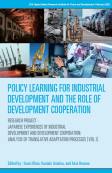Policy Learning for Industrial Development and the Role of Development Cooperation

Industrialization is a key driver of structural transformation, and many developing countries prioritize it. Industrial policies play a vital role in the process of industrialization. The focus of industrial policy debates in the international community has shifted from the theoretical (whether) to the practical (how) aspects of formulating and implementing effective industrial policies. There is also growing interest in the functions of industrial policy from contemporary perspectives, such as digitalization, the Sustainable Development Goals, and the “building back better” of the post-pandemic recovery. Nevertheless, few studies have analyzed the process of learning, selectively adopting, and tailoring foreign technologies and knowledge to country-specific situations while simultaneously considering the current global environment.
In such a context, this book contemplates the Japanese experiences that developing countries can refer to facilitate the formulation and implementation of their industrial policies. It also highlights the significance of policy learning and translative adaptation of other countries' experiences and indicates the importance of inculcating social capabilities that foster learning societies. The book also introduces development policy support, a type of Japanese intellectual cooperation aimed at providing hands-on policy advice and promoting the learning process of partner countries through joint work.
The volume contains 11 chapters, beginning with an overview of key concepts and perspectives, such as translative adaptation, real sector concern with ingredient approaches, and the features of Japanese developmental policy support. The chapters that follow address issues such as the following:
(Part I: The Role of Industrial Policy in Promoting Learning and Translative Adaptation: Diverse Country Experiences)
(i) Experiences of diverse countries with regard to formulating and implementing industrial policies and the process of indigenous learning during industrial catch-up
(ii) Japanese approaches to industrial policy formulation and implementation in the post-war high-growth period
(iii) Japanese experiences of policy learning toward industrialization in the Meiji era
(Part II: How Can Development Policy Support Facilitate Translative Adaptation?: Japanese Experiences)
(iv) specific examples of Japan’s industrial policy support to countries in Asia, Latin America, and Africa and their insights into Japanese development thinking and methods of intellectual cooperation emphasizing the real sector, long-term perspectives, and the process of local learning
(Part IIII: Future Perspectives and the Way Forward)
(v) the ongoing megatrends of industrial development, implications for industrial policy formulation, and the role of development cooperation
Ohno Izumi, senior research advisor at JICA Ogata Research Institute; Amatsu Kuniaki, professor at Yamaguchi University; and Hosono Akio, senior research advisor at JICA Ogata Research Institute, have edited this volume to report some of the outcomes of the “Research Project on the Japanese Experience of Industrial Development and Development Cooperation: Analysis of Translative Adaptation Processes.” Ohno and Yamada Minoru, executive senior research fellow at JICA Ogata Research Institute, jointly lead the overall project. This book is the first of a three-volume book series that compiles the intermediate findings of the research project.
Please click the links below for further details.
scroll